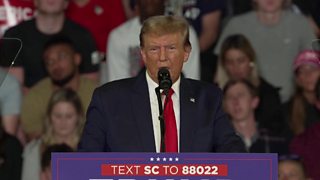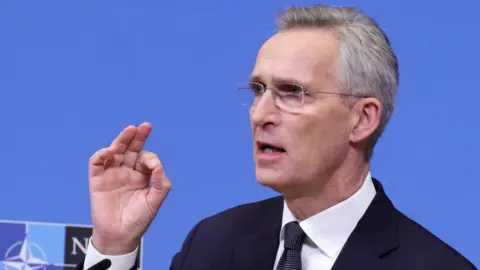A record 18 (out of 27) member countries are set to meet the defense alliance's target of spending 2% of their economic output on defense this year, NATO says
Secretary General Jens Stoltenberg said it was a marked increase from 11 out of NATO's 31 members a year ago.
- Germany is due to meet the threshold for the first time in decades.
- NATO leaders agreed in 2014 to commit at least 2% of their gross domestic product (GDP) on defence, after Russia's Vladimir Putin seized Crimea from Ukraine and Russian proxy forces occupied large areas of eastern Ukraine. At the time it was less than 1.5%.
German Chancellor Olaf Scholz declared on social media on Wednesday that his country would have the "highest defence budget" in Europe and would maintain the 2% target "in the decades to come... for safety and reliability".
Estonia has already said its defence budget will surpass 3% of its economic output this year, and that 0.25% of GDP will be provided in military aid to Ukraine.
- Estonian intelligence chief Kaupo Rosin warned on Tuesday that NATO could face a "Soviet-style mass army in the next decade".
Jens Stoltenberg told reporters on Wednesday that the number of countries expected to allocate 2% of economic output on defence this year was "another record number and a six-fold increase from 2014 when only three allies met the target".
He said that, overall, European nations and Canada will have spent an extra $600bn (€560bn; £477bn) on defence since the 2% target was set 10 years ago. He added, however, that while "real progress" was being made, "some allies "still have a way to go" in hitting the target.
Nevertheless, the NATO chief suggested the rise in expenditure showed that members were committed to spending more on defence, appearing to rebuke comments made by Donald Trump last week, in which he insinuated some Nato allies did not spend enough on defence.
- Speaking at a rally on Saturday, Mr Trump said he had once told a Nato leader he would not protect a nation behind on its payments, and would "encourage" the aggressors to "do whatever the hell they want".
- The remarks were denounced as "dangerous" and "un-American" by President Joe Biden, and condemned by the Nato secretary general and German chancellor.

Asked whether the US was aware of Nato's importance for Americans themselves, he added: "The United States has never fought a war alone."
Russia's full-scale invasion of Ukraine in 2022 heavily influenced Western defence spending last year, and 11 countries were expected to have met the 2% target in 2023.
- Seven more countries are likely to follow suit in 2024, and Germany's projected spending is set to climb to the equivalent $73.41bn (€68.5bn;£58.5bn), according to German press agency DPA.
- That would bring it to 2% of economic output for the first time since the early 1990s.
- It is a substantial rise for a country that largely focused on diplomacy and dialogue prior to Russia's full-scale invasion.
Uploaded: Feb 13, 2024
Kurt Volker, former U.S. ambassador to NATO, says Donald Trump could severely hobble the alliance if president again. Poland has prepared by spending 4% of GDP on defence, he says.
/cloudfront-us-east-2.images.arcpublishing.com/reuters/RLD3HDMULVNQTNHWS5SH5GOWUE.jpg)
/cloudfront-us-east-2.images.arcpublishing.com/reuters/NJJO45CBJFNXJH5H5RHPYI5AR4.jpg)






No comments:
Post a Comment